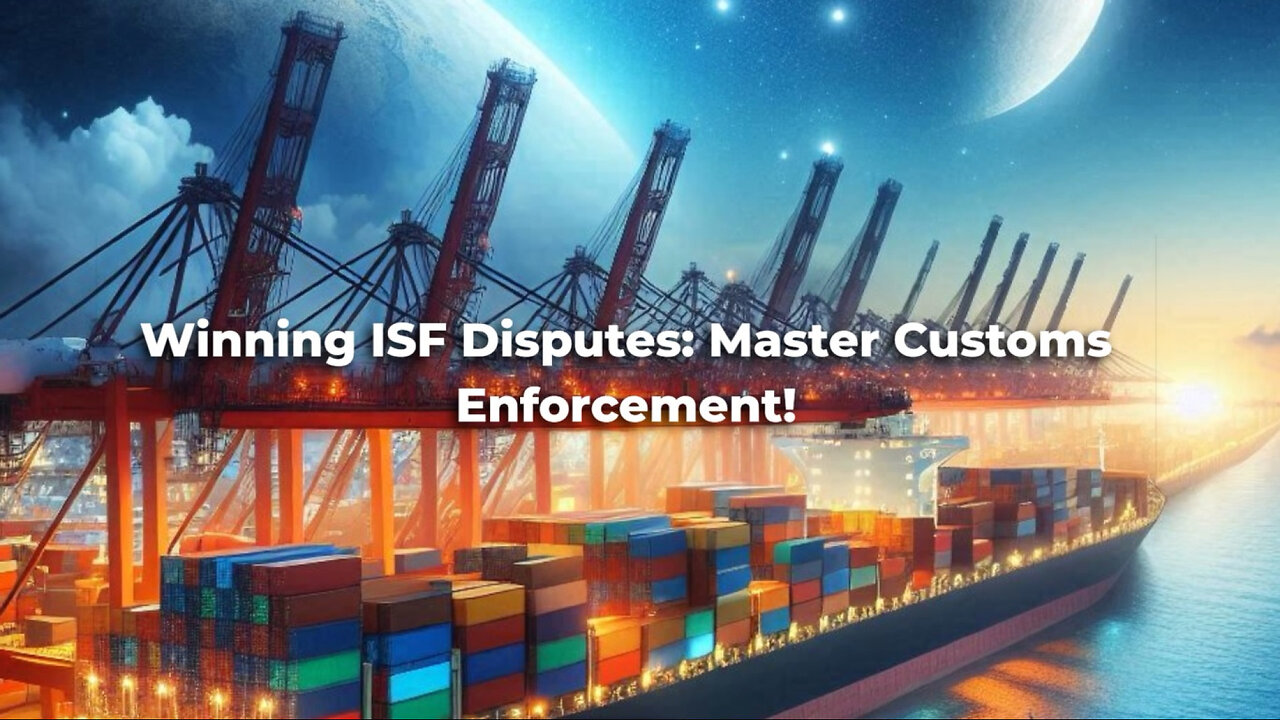Premium Only Content

Navigating ISF Penalties and Customs Enforcement: Tips for Dispute Resolution
* ISF Expert
* Phone: 505-359-0963
* Email: [email protected]
* https://isfexpert.com
In today's episode, we delved deep into the topic of ISF penalty dispute resolution and customs enforcement in the context of customs brokerage. We discussed the mandatory requirement of the Importer Security Filing (ISF) for all ocean shipments arriving in the United States and the potential penalties that importers may face for non-compliance.
There are two main types of ISF penalties: monetary penalties and liquidated damages. Monetary penalties are imposed when an ISF is not filed within the required timeframe or if it contains inaccurate or incomplete information. Liquidated damages, on the other hand, are imposed when an ISF is not filed at all.
To effectively resolve ISF penalties, it is crucial for importers to carefully review the penalty notice received from U.S. Customs and Border Protection (CBP) and understand the specific allegations and penalties imposed. Importers then have the option to either pay the penalty or dispute it.
Disputing an ISF penalty involves submitting a detailed response to CBP, explaining the reasons for disputing the penalty and providing supporting documentation or evidence that proves the importer's case. Maintaining a cooperative and open line of communication with CBP throughout the dispute resolution process is highly recommended to reach a mutually agreeable solution.
In addition to ISF penalties, it is important for importers to be aware of the various customs enforcement actions that CBP can take. These actions include inspections, audits, cargo holds, and seizures of goods. Understanding these enforcement actions can help importers proactively comply with customs regulations and avoid potential penalties.
CBP may conduct inspections to verify the accuracy of ISF information or to ensure compliance with other customs requirements. In some cases, random inspections may occur for security purposes, involving physical examination of the cargo or a review of the documentation.
CBP also has the authority to conduct audits on importers to ensure ongoing compliance with customs regulations. During an audit, CBP will closely examine import records, invoices, and other relevant documents to verify compliance.
In severe cases of non-compliance, CBP may impose cargo holds, delaying the release of goods until outstanding issues are resolved, or seize the goods altogether, resulting in their permanent loss. Importers should strive to maintain compliance with customs regulations to avoid these enforcement actions.
By thoroughly understanding ISF penalty dispute resolution and customs enforcement actions, customs brokerage professionals can assist importers in effectively navigating these processes, ensuring compliance, and minimizing potential penalties.
#usimportbond #isfcustomsbroker #uscustomsclearing #isfentry
Video Disclaimer Here: For educational purposes only, No connections to any US government organization.
00:36 - Understanding ISF Penalties
01:27 - Resolving ISF Penalties
02:05 - ISF Dispute Resolution Process
02:49 - Customs Enforcement Actions
-
 LIVE
LIVE
LFA TV
11 hours agoLIVE & BREAKING NEWS! | TUESDAY 11/11/25
3,657 watching -
 8:27
8:27
MattMorseTV
16 hours ago $14.60 earnedIlhan Omar IMPLICATED in $250,000,000 FRAUD RING.
25.8K121 -
 LIVE
LIVE
The Chris Salcedo Show
12 hours agoOur Vets Fought To Turn Over Our Country To Marxists & Leftists?
468 watching -
 15:11
15:11
Cash Jordan
16 hours agoIllegals ‘Force Out’ NYC Millionaires… "Communist" Mayor FREAKS as RESIDENTS LEAVE
26.2K26 -
 43:03
43:03
RiftTV
8 hours agoLeftists Scheme To Destroy the Economy | Guest: Brad Miller | DC Dive
17.4K5 -
 6:52
6:52
ThinkStory
16 hours agoThe INSANE Pennywise Daughter Theory - IT: Welcome to Derry
10K -
 7:49
7:49
Blackstone Griddles
14 hours agoEasy Weeknight Meals: Southwest Patty Melt
15.7K -
 52:51
52:51
A Cigar Hustlers Podcast Every Day
1 day agoEpisode 2 Hustler Every Day
11.3K -
 LIVE
LIVE
FyrBorne
3 hours ago🔴Battlefield 6 Live M&K Gameplay: Assault Might Actually Be OP In REDSEC
75 watching -
 36:10
36:10
ZeeeMedia
17 hours agoCash Quickly Becoming ILLEGAL & Silicon Valley's Devilish Endeavors | Daily Pulse Ep 140
62.5K42